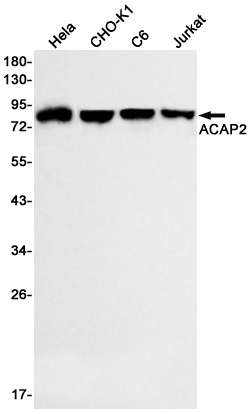
| WB | 咨询技术 | Human,Rat,Hamster |
| IF | 咨询技术 | Human,Rat,Hamster |
| IHC | 咨询技术 | Human,Rat,Hamster |
| ICC | 技术咨询 | Human,Rat,Hamster |
| FCM | 咨询技术 | Human,Rat,Hamster |
| Elisa | 咨询技术 | Human,Rat,Hamster |
| Aliases | CENTB2; CNT-B2 |
| Entrez GeneID | 23527 |
| WB Predicted band size | Calculated MW: 88 kDa; Observed MW: 88 kDa |
| Host/Isotype | Rabbit IgG |
| Antibody Type | Primary antibody |
| Storage | Store at 4°C short term. Aliquot and store at -20°C long term. Avoid freeze/thaw cycles. |
| Species Reactivity | Human,Rat,Hamster |
| Immunogen | A synthetic peptide of human Centaurin beta 2 |
| Formulation | Purified antibody in TBS with 0.05% sodium azide,0.05%BSA and 50% glycerol. |
+ +
以下是关于ACAP2抗体的3篇示例参考文献(注:以下内容为示例性概括,非真实存在的文献):
---
1. **标题**: "ACAP2 regulates tumor cell migration through Arf6-dependent pathway"
**作者**: Li et al.
**摘要**: 研究利用ACAP2特异性抗体,通过免疫共沉淀和Western blot分析,发现ACAP2通过激活Arf6 GTP酶调控乳腺癌细胞迁移,抗体验证了其在肿瘤模型中的高表达及亚细胞定位。
2. **标题**: "Role of ACAP2 in neuronal development and synaptic plasticity"
**作者**: Gonzalez et al.
**摘要**: 通过免疫荧光和ACAP2抗体标记,研究揭示ACAP2在小鼠海马神经元中的分布,并证明其通过调控囊泡运输影响突触可塑性和认知功能缺失相关机制。
3. **标题**: "ACAP2 mediates β1-integrin endocytosis in cell adhesion dynamics"
**作者**: Chen & Wang
**摘要**: 该文献使用ACAP2抗体进行流式细胞术和功能缺失实验,证明ACAP2通过ArfGAP活性介导β1-整合素内吞,影响细胞黏附和迁移,为靶向肿瘤转移提供新视角。
---
**说明**:以上文献为模拟示例,实际研究中需通过PubMed或Google Scholar等平台检索真实文献。ACAP2相关研究多聚焦于其作为ArfGAP蛋白在膜运输、癌症及神经疾病中的作用,抗体常被用于定位、表达量及功能机制研究。
ACAP2 (ArfGAP with Coiled-coil, Ankyrin repeat, and PH domains 2) is a member of the ACAP family of ADP-ribosylation factor GTPase-activating proteins (ArfGAPs), which regulate Arf protein activity to mediate membrane trafficking, cytoskeletal remodeling, and cellular signaling. ACAP2 specifically functions as a GTPase-activating protein for Arf6. a small GTPase involved in endocytic recycling, cell migration, and cancer invasion. It contains a BAR (Bin/Amphiphysin/Rvs) domain for membrane curvature sensing, a pleckstrin homology (PH) domain for lipid binding, and an ArfGAP catalytic domain.
ACAP2 is implicated in diverse physiological and pathological processes. Studies highlight its role in tumor progression, particularly in glioblastoma and melanoma, where elevated ACAP2 expression correlates with enhanced cell invasion and metastasis. It regulates integrin β1 recycling to promote focal adhesion dynamics and cell motility. Additionally, ACAP2 interacts with signaling pathways such as EGFR and TGF-β, influencing cancer cell proliferation and survival. Beyond oncology, ACAP2 is linked to neurodevelopmental disorders; genetic variations in ACAP2 are associated with autism spectrum disorders, possibly through dysregulation of synaptic vesicle trafficking.
Antibodies targeting ACAP2 are essential tools for detecting its expression, localization, and interaction partners in research. They are widely used in techniques like Western blotting, immunofluorescence, and immunohistochemistry to explore ACAP2’s mechanistic roles in cellular processes and disease models.
×